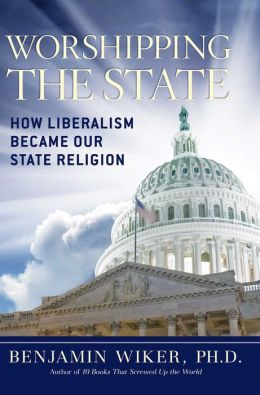How Liberalism Became Our State Religion – April 5, 2013
Dr. Benjamin Wiker
Dr. Benjamin Wiker is one of the most popular speakers ever to appear on the campus of Colorado Christian University. He is enthusiastically remembered for his presentation on Ten Books That Screwed Up The World. Returning to CCU in April, Dr. Wiker will analyze “How Liberalism Became Our State Religion” and offer a "simple, step-by-step strategy for disestablishing the state church of secularism."
....
Praise for Worshipping the State
“This wide-ranging and clearly-written account of the intellectual background of recent efforts to drive Christianity from public life makes clear the depth of the problem. Wiker's account covers figures from Machiavelli through Spinoza, Locke, Jefferson, and the founders of today's education system, and emphasizes the ways in which influential anti-Christian thinkers who may seem very different from each other agree on basic issues. It is a sobering call for the transformation of political and academic life that should be taken seriously by anyone alarmed by the current plunge into the soft totalitarianism of radical secularism.”
James Kalb, author of The Tyranny of Liberalism: Understanding and Overcoming Administered Freedom, Inquisitorial Tolerance, and Equality by Command
“Ben Wiker’s book is a no-holds-barred assault on liberalism, as the established (secularist) religion of our times. Current discussions of American public philosophy have to confront these fundamental questions: Has liberalism taken an unfortunate turn – one that was not inevitable – and can it be rehabilitated? Or was it rotten at its core, from the start, and therefore irredeemable? This book lays out, with power and passion, one way of answering those questions, and deserves to be part of that discussion.”
Christopher Wolfe, Ph.D., Emeritus Professor of Political Science at Marquette University, Co-director of the Thomas International Center, and author of Natural Law Liberalism (Cambridge)
“Benjamin Wiker's book is the most forthright and unblinking analysis yet published of the ubiquitous assault on religion in American society. Not only every religious believer but every believer in religious liberty should read it.'
James Hitchcock, Professor of History, St. Louis University and author of What is Secular Humanism?, The Recovery of the Sacred, and The Supreme Court and Religion in American Life.
Christianity is being deliberately pushed out of our culture—so that secular liberalism can be established in its place. I use the term “establish” quite deliberately. One religion is being actively disestablished, while another is being (in fact, largely has been) established in its place.
Liberalism is more than a political persuasion. It’s a religion with its own doctrines about cosmology and morality. I am aware that this is a controversial claim; it will take the bulk of this book to prove it.The religious nature of liberalism is obscured by liberals' ostensible embrace of neutrality, pluralism, and tolerance. These are the reasons given for the disestablishment of Christianity. But what actually occurs is that ‘neutrality, pluralism, and tolerance’ are inevitably used as instruments for establishing liberal doctrines and dogmas in the place of Christian ones.
But just exactly what is liberalism? Historians have difficulty pinning down a definition that clears up the many different ways the term ‘liberal’ has been applied. To help clear up this confusion, we are going to have to do a little history, and the key to understanding the historical development of liberalism is the above-noted animosity of liberalism to Christianity.
When we follow the development from contemporary liberalism to its roots, we discover that the liberals in ascendancy in America today are the intellectual heirs of a way of thinking that from the beginning has been characterized by a desire to be free from the burden of Christianity. (Liber in Latin means free.) Anti-Christian liberalism is much older than the ACLU and the Freedom from Religion Foundation. It arose about five hundred years ago within an almost entirely Christianized culture. As a rebellion against Christianity, its negative goal defined its positive form: the desire to remove the church and replace it with the state gave liberalism its structure, beliefs, and goals.
Freedom from Christianity defines the political goal of liberalism. As the liberal state takes over the form and functions of the church, it excludes the actual Christian church from having any presence or influence in the public square. In its most virulent forms it actually persecutes Christians, as if Christianity were a kind of heresy deviating from the liberal religion.
TABLE OF CONTENTS
Part I: The War on Christianity
Chapter 1: Reading the Signs of Our Times
Part II: Christianity Destroys the Pagan Idol of the State
Chapter 2: Back to the Beginning: the Church versus Pagan Imperial Rome
Chapter 3: How the Bible Kept the Church from Becoming a Department of the State
Chapter 4: From the Conversion of Constantine to the Fall of Rome
Chapter 5: The Middle Ages: Defining the Church-State Distinction
Part III: The Rise of Liberalism and the Re-Paganization of the State
Chapter 6: Machiavelli Invents the Secular State and Its Church
Chapter 7: From Henry VIII to Thomas Hobbes: the State Church, Leviathan, and the Sovereign Individual
Chapter 8: Spinoza: the Liberal Elite and the Established Secular Church
Chapter 9: Rousseau’s Radical Liberalism: Establishing Civil Religion
Part IV: The New Big Picture
Chapter 10: Liberalism Triumphs in the Modern World
Chapter 11: Sorting Out the Confusions
Chapter 12: John Locke and the Two Faces of Liberalism
Part IV: Liberalism Comes to America
Chapter 13: The First Wave: Locke, Deism, and the Founders
Chapter 14: The Second Wave: Radicals at the Universities
Chapter 15: Secularization, American Style
Part VI: Disestablishment
Chapter 16: Disestablishing Secular Liberalism

No comments:
Post a Comment